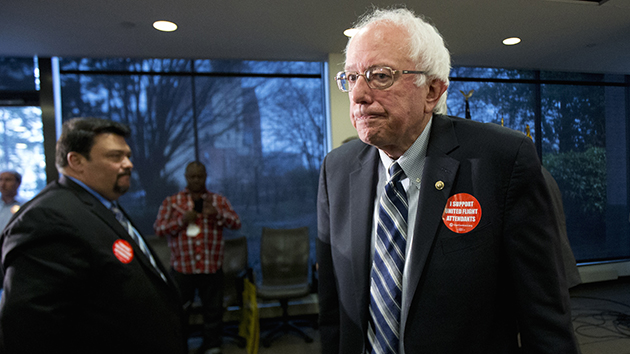
Manuel Balce Ceneta/AP
At a press conference Friday afternoon, Jeff Weaver, Bernie Sanders’ campaign manager, threatened legal action against the Democratic National Committee for cutting off the Sanders’ presidential campaign from critical voter data, such as addresses and phone numbers of potential supporters. The DNC took this step after a Sanders campaign staffer on Thursday accessed private voter data belonging to the Hillary Clinton campaign in a breach that the Sanders campaign has denounced.
“We will be in federal court this afternoon seeking immediate relief,” Weaver said. Our data “has been stolen by the DNC.”
Weaver’s threat was the latest move in a serious—and complicated—digital dustup involving the Sanders and Clinton campaigns, the DNC, and a contractor hired by the Democratic Party to maintain voter data for various campaigns. This contractor, NGP VAN, is supposed to keep data for different campaigns separate. But on Thursday, news broke that at least one member of the Sanders campaign accessed Clinton campaign data when a firewall temporarily went down. Evidence surfaced Friday that more than one staffer of the Sanders campaign had access to the Clinton campaign voter data, and that some of the information had been downloaded.
The Sanders campaign immediately fired a staffer responsible and is undertaking an internal review into what happened and who else was involved. But the Sanders campaign insists that fault also belongs to the DNC and NGP VAN for the firewall failure. “Given that it is the DNC’s responsibility to secure the voter data file, the DNC failed in this regard,” the campaign said in a statement released Friday.
In response to the breach, the DNC revoked access for the Sanders campaign to this database—which includes crucial voter data collected by the campaign itself—until the campaign can prove it has destroyed any Clinton campaign data that it downloaded. The Sanders campaign needs this information in order to maintain contact with voters and reach out to supporters, especially as the initial voting and caucusing approaches. The lawsuit threat is an indication of how serious the situation is for the Sanders campaign.
The incident has given the Sanders campaign an opportunity to bolster its long-running claim that the DNC favors Clinton, though the party insists that is not true. “This is taking our campaign hostage,” Weaver said of the DNC’s action.
As of Friday afternoon, the Clinton campaign had said nothing about the breach or the threatened lawsuit. Saturday is the third Democratic debate, and it may well be that Sanders and Clinton address this issue there.
Update: The Clinton campaign commented on the situation.
Clinton campaign speaks on data breach. @brianefallon: pic.twitter.com/iR19tUQ7hk
— Alex Seitz-Wald (@aseitzwald) December 18, 2015












